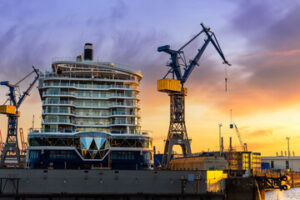Home » Construction Services
Category Archives: Construction Services
What Is a Marine Contractor?
Marine Contractor Near Me is a specialized field in which professionals construct, repair, and maintain coastal structures. This includes erosion control projects like bulkheads, seawalls, groins, jetties, rock sills, coastal bluff reshaping, marsh establishment, and beach nourishment.

When choosing a marine contractor, look for one with stable, experienced leadership. They should also have comprehensive insurance coverage for products, general liability, and workers’ compensation.
Marine construction poses unique safety challenges that are not found in traditional on-land construction. Whether it is working around a commercial dock or completing a boardwalk, the safety of the crew and any pedestrians present is a crucial factor.
In addition, unlike other industries where safety is focused on compliance with government regulations, maritime workers must adhere to specific guidelines set forth by the International Maritime Organization (IMO). These rules include document procedures for environmental impact assessment reports, implementing life-saving appliances, and training requirements for crew members.
Moreover, marine contractors are responsible for monitoring air and water quality, which requires them to develop and implement an effective safety program. The program should also be communicated to each crew member and include regular training sessions. A marine contractor should also be aware of the risks associated with offshore work, such as ship collisions and piracy.
Marine contractors need to adapt to the constantly evolving regulatory environment at all levels, including state, federal and national. They must also comply with international conventions which regulate maritime pollution and the transfer of dangerous substances. In addition, they must be able to respond quickly to client or audit requests for safety records and documentation.
When selecting a marine contractor, look for one that has a solid reputation and a stable ownership structure. A stable company is more likely to invest in safety and other high-quality projects, while also remaining financially sound when business is slow. A financially strong marine contractor can also provide you with more competitive pricing and a better guarantee of meeting deadlines.
Another factor to consider is the availability of innovative technology that can help a marine contractor improve efficiency and safety. For instance, companies such as Sinay offer metocean software that allows marine contractors to monitor ocean conditions in real-time, receive alerts when a threshold is exceeded and deliver a preliminary metocean analysis and report in just a few minutes. This is a big advantage because it allows you to be more productive and save time.
Experience
A marine contractor has extensive experience with a wide range of projects in the water. Whether they’re building docks, marinas, or boat lifts, they have a history of working with water and are qualified to complete the project at hand. A professional marine construction company will have a team of workers with experience in the field and in the office. This will allow them to provide clients with the highest quality work and service.
A well-established marine construction company will have an experienced management team with strong leadership skills. This will ensure that the company can meet its commitments and deadlines. They should also have a good track record of completing similar projects in the past. If a marine construction company has high employee retention, it indicates that they are dedicated to their employees and the success of their clients.
One of the main risks for marine contractors is the exposure to large-scale weather events, such as hurricanes or floods. These events can shutter a business and sink profits. It’s important that marine contractors have a customized insurance program in place to protect against these types of losses.
Another risk for marine contractors is their exposure to third-party liability. Their operations are located on the water and share navigation routes with a growing volume of vessels. This can expose them to collision liability and may result in significant claims for the contractor.
It is important that marine contractors are able to adapt quickly to evolving regulations at all levels. This is especially critical when it comes to environmental requirements. Marine contractors that are unable to adapt can fall behind in the industry and lose their competitive edge.
A marine construction company should be able to offer clients the latest technologies for planning and execution of their projects. Using innovative tools and data can improve efficiency, sustainability, and reduce costs. For example, Sinay offers high-quality metocean data and state-of-the-art tools that help marine contractors plan and execute their maritime operations more effectively. In addition, these tools can help them improve their ETA predictions and optimize their logistics modules.
Reputation
Marine construction involves building structures in or adjacent to large bodies of water, mostly the sea. Such structures include ships, docks, boat lifts, bulkheads, piers, and other infrastructure. Marine contractors play a vital role in the smooth running of maritime business, contributing to efficiency and sustainability. They need to rely on new technologies to stay competitive and to adapt quickly to rapidly evolving regulation at state, federal and international level.
However, many public marine construction companies are under pressure to cut costs and preserve share value. This often results in cutting safety, maintenance, personnel, insurance and other expenses until business picks up again. Look for stable private businesses with experienced, long-tenured leadership. They are more likely to survive downturns and continue delivering on their commitments.
Insurance
Marine contractors help keep the world’s watercrafts afloat. As such, their work is complex and dangerous and requires specialized insurance coverage. Whether they are building docks, performing shoreline restoration or other maritime construction, marine contractors face major perils that can halt operations and sink profits. Tailored insurance covers their equipment, employees, projects and profitability.
The main insurance needs of a marine contractor include general liability, workers’ compensation and property insurance. These policies protect the marine contractor from lawsuits alleging personal injury, damage to property or libel or slander. In addition to these essential coverages, marine contractors also need specialty insurance policies such as marine general liability and inland marine. Marine general liability provides coverage for work on vessels and docks that are excluded from commercial general liability. This policy also includes product and completed operations coverage and marine hull and machinery coverage. Inland marine is another important policy that provides coverage for the equipment owned or leased by a marine contractor, including trailers and other vehicles used to transport the contractor’s equipment. It also includes business interruption coverage that pays for operating and recurring expenses when a project is interrupted by an insured peril.
Marine contractors also need workers’ compensation insurance for their employees. This coverage protects employees if injured on the job and helps cover medical bills and lost wages. Additionally, it shields businesses from expensive lawsuits.
